- Home
- Harlan Ellison
The Kyben Stories Page 2
The Kyben Stories Read online
Page 2
Then he had awakened and known it was real. He was trapped, and there was no way out. Death had come to live with him. He was going to die.
Terrence had never been a coward, nor had he been a hero. He was one of the men who fight wars because they are always fought by someone. He was the kind of man who would allow himself to be torn from wife and home and flung into an abyss they called Space to defend what he had been told needed defense. But it was in moments like this that a man like Terrence began to think.
Why here? Why like this? What have I done that I should finish in a filthy spacesuit on a lost rock—and not gloriously like they said in the papers back home, but starving or bleeding to death alone with a crazy robot? Why me? Why me? Why alone?
He knew there could be no answers. He expected no answers.
He was not disappointed.
When he awoke, he instinctively looked at the clock. Its shattered face looked back at him, jarring him, forcing his eyes open in after-sleep terror. The robot hummed and emitted a spark. He kept his eyes open. The humming ceased. His eyes began to burn. He knew he couldn’t keep them open too long.
The burning worked its way to the front of his eyes, from the top and bottom, bringing with it tears. It felt as though someone was shoving needles into the corners. The tears ran down over his cheeks.
His eyes snapped shut. The roaring grew in his ears. The robot didn’t make a sound.
Could it be inoperative? Could it have worn down to immobility? Could he take the chance of experimenting?
He slid down to a more comfortable position. The robot charged forward the instant he moved. He froze in mid-movement, his heart a chunk of ice. The robot stopped, confused, a scant ten inches from his outstretched foot. The machine hummed to itself, the noise of it coming both from the machine before him and from somewhere behind the wall.
He was suddenly alert.
If it had been working correctly, there would have been little or no sound from the appendage, and none whatsoever from the brain. But it was not working properly, and the sound of its thinking was distinct.
The robot rolled backward, its “eyes” still toward Terrence. The sense orbs of the machine were in the torso, giving the machine the look of a squat metal gargoyle, squared and deadly.
The humming was growing louder, every now and then a sharp pfffft! of sparks mixed with it. Terrence had a moment’s horror at the thought of a short-circuit, a fire in the life hutch, and no service robot to put it out.
He listened carefully to pinpoint the location of the robot’s brain built into the wall.
Then he thought he had it. Or was it there? It was either in the wall behind a bulkhead next to the refrigerator, or behind a bulkhead near the relay machines. The two possible housings were within a few feet of each other, but they might make a great deal of difference.
The distortion created by the steel plate in front of the brain, and the distracting background noise of the robot broadcasting it made it difficult to tell exactly which was the correct location.
He drew a deep breath.
The ribs slid a fraction of an inch together, their broken ends grinding.
He moaned.
A high-pitched tortured moan that died quickly, but throbbed back and forth inside his head, echoing and building itself into a paean of sheer agony! It forced his tongue out of his mouth, limp in a comer of his lips, moving slightly. The robot rolled forward. He drew his tongue in, clamped his mouth shut, cut off the scream inside his head at its high point!
The robot stopped, rolled back to its duty-niche.
Oh, God! The pain! The God God where are you pain!
Beads of sweat broke out on his body. He could feel their tickle inside his spacesuit, inside his jumper, inside the bodyshirt, on his skin. The pain of the ribs was suddenly heightened by an irresistible itching of his skin.
He moved infinitesimally within the suit, his outer appearance giving no indication of the movement. The itching did not subside. The more he tried to make it stop, the more he thought about not thinking about it, the worse it became. His armpits, the crooks of his arms, his thighs where the tight service-pants clung—suddenly too tightly—were madness. He had to scratch!
He almost started to make the movement. He stopped before he started. He knew he would never live to enjoy any relief. A laugh bubbled into his head. God Almighty, and I always laughed at the slobs who suffered with the seven-year itch, the ones who always did a little dance when they were at attention during inspection, the ones who could scratch and sigh contentedly. God, how I envy them. His thoughts were taking on a wild sound, even to him.
The prickling did not stop. He twisted faintly. It got worse. He took another deep breath.
The ribs sandpapered again.
This time, blessedly, he fainted from the pain.
“Well, Terrence, how do you like your first look at a Kyben?”
Ernie Terrence wrinkled his forehead and ran a finger up the side of his face. He looked at his Commander and shrugged. “Fantastic things, aren’t they?”
“Why fantastic?” asked Commander Foley.
“Because they’re just like us. Except of course the bright yellow pigmentation and the tentacle-fingers. Other than that they’re identical to a human being.”
The Commander opaqued the examination-casket and drew a cigarette from a silver case, offering the Lieutenant one. He puffed it alight, staring with one eye closed against the smoke. “More than that, I’m afraid. Their insides look like someone had taken them out, liberally mixed them with spare parts from several other species, and jammed them back in any way that fitted conveniently. For the next twenty years we’ll be knocking our heads together trying to figure out their metabolic raison d’ être.”
Terrence grunted, rolling his unlit cigarette absently between two fingers. “That’s the least of it.”
“You’re right,” agreed the Commander. “For the next thousand years we’ll be trying to figure out how they think, why they fight, what it takes to get along with them, what motivates them.”
If they let us live that long, thought Terrence.
“Why are we at war with the Kyben?” he asked the older man. “I mean really.”
“Because the Kyben want to kill every human being they can recognize as a human being.”
“What have they got against us?”
“Does it matter? Maybe it’s because our skin isn’t bright yellow; maybe it’s because our fingers aren’t silken and flexible; maybe it’s because our cities are too noisy for them. Maybe a lot of maybes. But it doesn’t matter. Survival never matters until you have to survive.”
Terrence nodded. He understood. So did the Kyben. It grinned at him and drew its blaster. It fired point-blank, crimsoning the hull of the Kyben ship.
He swerved to avoid running into his gun’s own backlash. The movement of the bucket seat sliding in its tracks, keeping his vision steady while maneuvering, made him dizzy. He closed his eyes for a moment.
When he opened them, the abyss was nearer, and he teetered, his lips whitening as they pressed together under his effort to steady himself. With a headlong gasp he fell sighing into the stomach. His long, silken fingers jointed steely humming clankingly toward the medicine chest ever over the plate behind the bulkhead.
The robot advanced on him grindingly. Small fine bits of metal rubbed together, ashing away into a breeze that came from nowhere as the machine raised lead boots toward his face.
Onward and onward till he had no room to move and then ...
The light came on, bright, brighter than any star Terrence had ever seen, glowing, broiling, flickering, shining, bobbing a ball of light on the chest of the robot, who staggered, stumbled, stepped.
The robot hissed, hummed and exploded into a million flying, racing fragments, shooting beams of light all over the abyss over which Terrence again teetered, teetering. He flailed his arms wildly trying to escape but at the last moment, before the fall
H
e awoke with a start!
He saved himself only by his unconscious. Even in the hell of a nightmare he was aware of the situation. He had not moaned and writhed in his delirium. He had kept motionless and silent.
He knew it was true, because he was still alive.
Only his surprised jerking, as he came back to consciousness, started the monster rolling from its niche. He came fully awake and sat silent, slumped against the wall. The robot retreated.
Thin breath came through his nostrils. Another moment and he would have put an end to the past three days—three days or more now? how long had he been asleep? —days of torture.
He was hungry. Lord how hungry he was. The pain in his side was worse now, a steady throbbing that made even shallow breathing tortuous. He itched maddeningly. He was uncomfortably slouched against a cold steel bulkhead, every rivet having made a burrow for itself in his skin. He wished he was dead.
He didn’t wish he was dead. It was all too easy to get his wish.
If he could only disable that robot brain. A total impossibility. If he could only wear Phobos and Deimos for watch fobs. If he could only shack-up with a silicon-deb from Penares. If he could only use his large colon for a lasso.
It would take a thorough destruction of the brain to do it enough damage to stop the appendage before it could roll over and smash Terrence again.
With a steel bulkhead between him and the brain, his chances of success totaled minus zero every time.
He considered which part of his body the robot would smash first. One blow of that tool-hand would kill him if it was used a second time. With the state of his present wounds, even a strong breath might finish him.
Perhaps he could make a break and get through the lock into the decompression chamber...
Worthless. (A) The robot would catch him before he had gotten to his feet, in his present condition. (B) Even allowing a miracle, even if he did get through the lock, the robot would smash the lock port, letting in air, ruining the mechanism. (C) Even allowing a double miracle and it didn’t, what the hell good would it do him? His helmet and gloves were in the hutch itself, and there was no place to go on the planetoid. The ship was ruined, so no signal could be sent from there.
Doom suddenly compounded itself.
The more he thought about it, the more certain he was that soon the light would flicker out for him.
The light would flicker out.
The light would flicker...
The light...
...light...?
Oh God, is it possible? Can it be? Have I found an answer? He marveled at the simplicity of it. It had been there for more than three days waiting for him to use it. It was so simple it was magnificent. He could hardly restrain himself from moving, just out of sheer joy.
I’m not brilliant, I’m not a genius, why did this occur to me? For a few minutes the brilliance of the solution staggered him. Would a less intelligent man have solved the problem this easily? Would a moreintelligent man have done it? Then he remembered the dream. The light in the dream. He hadn’t solved the problem, his unconscious had. The answer had been there all the time, but he was too close to see it. His mind had been forced to devise a way to tell him. Luckily, it had.
And finally, he didn’t care howhe had uncovered it. His God, if he had had anything to do with it, had heard him. Terrence was by no means a religious man, but this was miracle enough to make him a believer. It wasn’t over yet, but the answer was there—and it was an answer.
He began to save himself.
Slowly, achingly slowly, he moved his right hand, the hand away from the robot’s sight, to his belt. On the belt hung the assorted implements a spaceman needs at any moment in his ship. A wrench. A packet of sleep-stavers. A compass. A geiger counter. A flashlight.
The last was the miracle. Miracle in a tube.
He fingered it almost reverently, then unclipped it in a moment’s frenzy, still immobile to the robot’s “eyes.”
He held it at his side, away from his body by a fraction of an inch, pointing up over the bulge of his spacesuited leg.
If the robot looked at him, all it would see would be the motionless bulk of his leg, blocking off any movement on his part. To the machine, he was inert. Motionless.
Nowhe thought wildly, where is the brain?
If it is behind the relay machines, I’m still dead. If it is near the refrigerator, I’m saved. He could afford to take no chances. He would have to move.
He lifted one leg.
The robot moved toward him. The humming and sparking were more distinct this time. He dropped the leg.
Behind the plates above the refrigerator!
The robot stopped, nearly at his side. Seconds had decided. The robot hummed, sparked, and returned to its niche.
Now he knew!
He pressed the button. The invisible beam of the flashlight leaped out, speared the bulkhead above the refrigerator. He pressed the button again and again, the flat circle of light appearing, disappearing, appearing, disappearing on the faceless metal of the life hutch’s wall.
The robot sparked and rolled from its niche. It looked once at Terrence. Its rollers changed direction in an instant and the machine ground toward the refrigerator.
The steeled fist swung in a vicious arc, smashing with a deafening clang! at the spot where the light bubble flickered on and off.
It swung again and again. Again and again till the bulkhead had been gouged and crushed and opened, and the delicate coils and plates and circuits and memorex modules behind it were refuse and rubble. Until the robot froze, with arm half-ready to strike again. Dead. Immobile. Brain and appendage.
Even then Terrence did not stop pressing the flashlight button. Wildly he thumbed it again and again and again.
Then he realized it was all over.
The robot was dead. He was alive. He would be saved. He had no doubts about that. Now he could cry.
The medicine chest grew large through the shimmering in his eyes. The relay machines smiled at him.
God bless you, little life hutch, he thought, before he fainted.
THE CRACKPOTS
He was standing on a street corner, wearing a long orange nightgown and a red slumber-cap with a tassel. He was studiously picking his nose.
“Watch him!” cried Furth. “Watch what he does! Get the technique accurately!”
For this I studied four years to become an expert? thought Themus.
Furth looked at the younger man for the first time in several minutes. “Are you watching him?” The elder Watcher nudged his companion, causing Themus’ dictobox to bump unceremoniously against his chest.
“Yes, yes, I’m watching,” answered Themus, “but what possible reason could there be to watch a lunatic picking his nose on a public street comer?” Annoyance rang in his voice.
Furth swung on him, his eyes cold-steel. “You watch them, that’s your job. And don’t ever forget that! And dictate it into that box strapped to your stupid shoulders. If I ever catch you failing to notice and dictate what they’re doing, I’ll have you shipped back to Central and then into the Mines. You understand what I’m saying?”
Themus nodded dumbly, the attack having shocked and surprised him, so sudden and intensive was it.
He watched the Crackpot.
His stomach felt uneasy. His voice quavered as he described in minute detail, as he had been taught, the procedure. It made his nose itch. He ignored it. Soon the Crackpot gave a little laugh, did a small dance step, and skipped out of sight across the street and around the corner.
Themus spoke into the Communicator-Attachment on his box: “Watcher, sector seventy, here. Male, orange nightgown, red slumber-cap, coming your way. Pick him up, sixty-nine. He’s all yours. Over.”
An acknowledging buzz came from the Attachment, Themus said, “Out here,” and turned the Attachment off.
Furth, who had been dictating the detailed tying of a can on the tail of a four-legged Kyben dog by a tall, bald Crackpot,
concluded his report as the dog ran off barking wildly, muttered, “Off, “ into the dicto-box and turned once more to Themus. The younger Watcher tightened inside. Here it comes.
Unexpectedly, the senior Watcher’s voice was quiet, almost gentle. “Come with me, Themus, I want to talk with you.”
They strode through the street of Valasah, capital of Kyba, watching the other branch of Kyben. The native Kyben, those who put light-tubes in their mouths and twisted their ears in expectation of fluorescence, those who pulled their teeth with adjusto-wrenches, those who sat and scribbled odd messages on the sidewalks, called the armor-dressed Kyben “Stuffed-Shirts.” The governing Kyben, those with the armor and high-crested metal helmets bearing the proud emblem of the eye-and-eagle, called their charges, “Crackpots,”
They were both Kyben.
There was a vast difference.
Furth was about to delineate the difference to his new aide. The senior Watcher’s great cape swirled in a rain of black as he turned into the Pub-crawler.
At a table near the front, Furth pulled his cape about his thighs and sat down, motioning Themus to the other chair.
The waiter walked slowly over to them, yawning behind his hand, Furth dictated the fact briefly. The waiter gave a high-pitched maniacal laugh. Themus felt his blood chill. These people were all mad, absolutely mad.
“Two glasses of greth, “ Furth said.
The waiter left. Furth recorded the fact. The waiter had kicked him before he had gone behind the bar.
When the drinks arrived, Furth took a long pull from the helix-shaped glass, slumped back, folded his hands on the table and said, “What did you learn at Academy-Central?”
The question took Themus by surprise. “Wh—what do you mean? I learned a great many things.”
“Such as? Tell me.”
“Well, there was primary snooping, both conscious and subconscious evaluation; reportage—four full years of it—shorthand, applied dictology, history, manners, customs, authority evaluation, mechanics, fact assemblage...”

 Repent, Harlequin! Said the Ticktockman
Repent, Harlequin! Said the Ticktockman Broken Glass
Broken Glass Other Glass Teat
Other Glass Teat Memos From Purgatory
Memos From Purgatory I Have No Mouth and I Must Scream
I Have No Mouth and I Must Scream The Deadly Streets
The Deadly Streets The Glass Teat
The Glass Teat Paingod and Other Delusions
Paingod and Other Delusions No Doors No Windows
No Doors No Windows Strange Wine
Strange Wine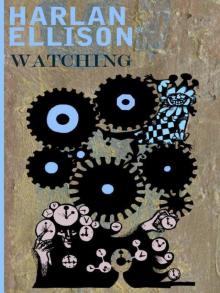 Harlan Ellison's Watching
Harlan Ellison's Watching Over the Edge/An Edge in My Voice
Over the Edge/An Edge in My Voice Troublemakers: Stories by Harlan Ellison
Troublemakers: Stories by Harlan Ellison Gentleman Junkie and Other Stories of the Hung-Up Generation
Gentleman Junkie and Other Stories of the Hung-Up Generation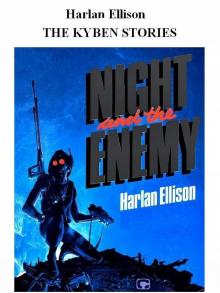 The Kyben Stories
The Kyben Stories From the Land of Fear
From the Land of Fear The Top of the Volcano: The Award-Winning Stories of Harlan Ellison
The Top of the Volcano: The Award-Winning Stories of Harlan Ellison Sleepless Nights in the Procrustean Bed
Sleepless Nights in the Procrustean Bed Ellison Wonderland
Ellison Wonderland Children of the Streets
Children of the Streets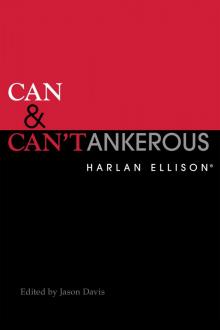 Can & Can'tankerous
Can & Can'tankerous Love Ain't Nothing but Sex Misspelled
Love Ain't Nothing but Sex Misspelled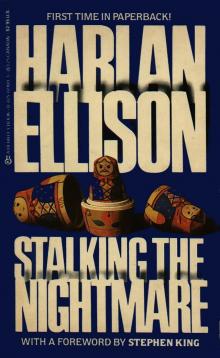 Stalking the Nightmare
Stalking the Nightmare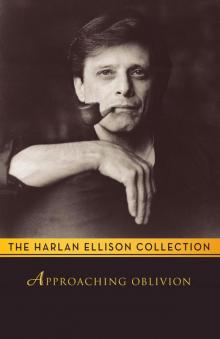 Approaching Oblivion
Approaching Oblivion Deathbird Stories
Deathbird Stories Partners in Wonder
Partners in Wonder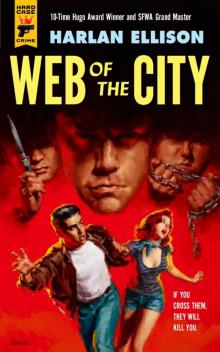 Web of the City
Web of the City Spider Kiss
Spider Kiss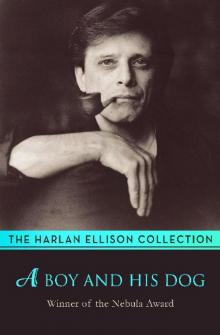 A Boy and His Dog
A Boy and His Dog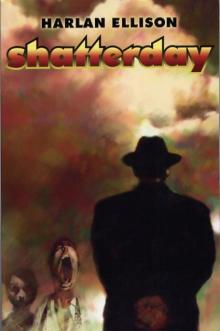 Shatterday
Shatterday Slippage: Previously Uncollected, Precariously Poised Stories
Slippage: Previously Uncollected, Precariously Poised Stories Repent, Harlequin! Said the Ticktockman
Repent, Harlequin! Said the Ticktockman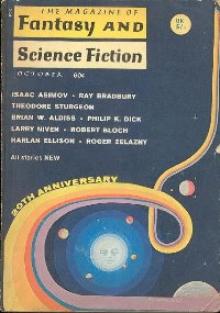 Come to Me Not in Winter's White
Come to Me Not in Winter's White The Song the Zombie Sang
The Song the Zombie Sang The Other Glass Teat
The Other Glass Teat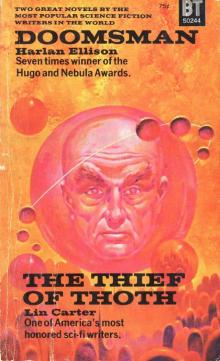 Doomsman - the Theif of Thoth
Doomsman - the Theif of Thoth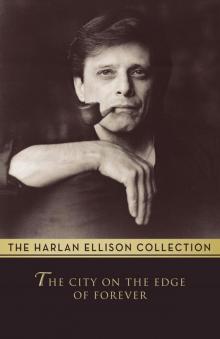 The City on the Edge of Forever
The City on the Edge of Forever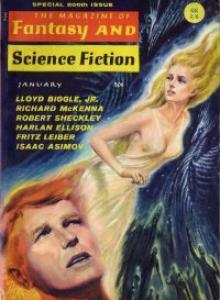 I See a Man Sitting on a Chair, and the Chair Is Biting His Leg
I See a Man Sitting on a Chair, and the Chair Is Biting His Leg The Harlan Ellison Hornbook
The Harlan Ellison Hornbook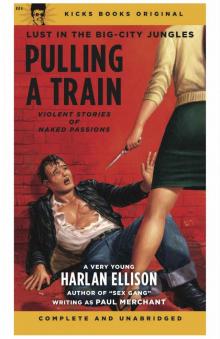 Pulling A Train
Pulling A Train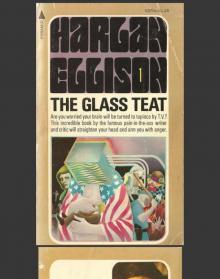 The Glass Teat - essays of opinion on the subject of television
The Glass Teat - essays of opinion on the subject of television An Edge in My Voice
An Edge in My Voice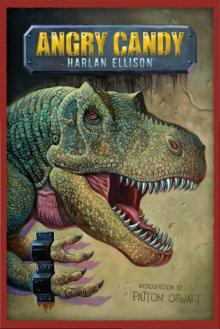 Angry Candy
Angry Candy Troublemakers
Troublemakers The Top of the Volcano
The Top of the Volcano Over the Edge
Over the Edge Survivor #1
Survivor #1 Slippage
Slippage